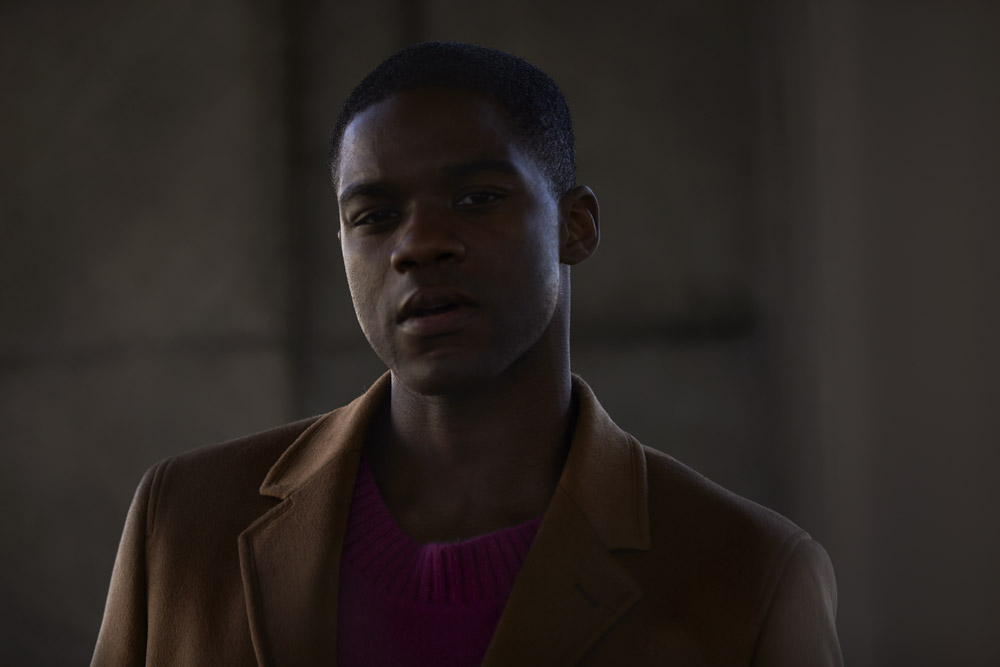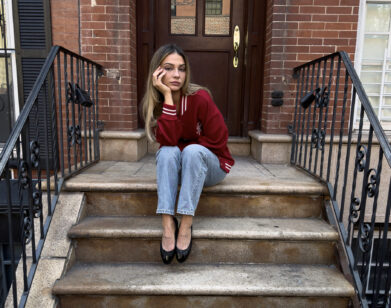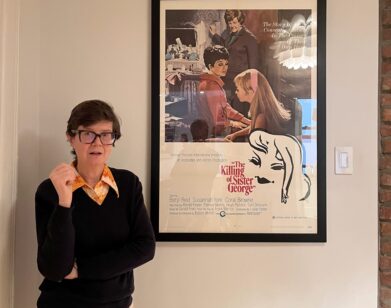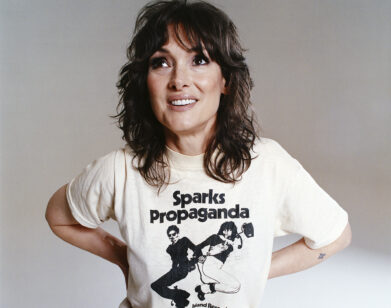The Scene Stealer
JOVAN ADEPO IN LOS ANGELES, OCTOBER 2016. PHOTOS: DANI BRUBAKER. STYLING: LAUREN KNUDSEN/WALTER SCHUPFER MANAGEMENT. GROOMING: JEN FIAMENGO FOR KATE SOMERVILLE/WALTER SCHUPFER MANAGEMENT.
Jovan Adepo is off to a pretty good start. Born in Oxfordshire, England to an American father and English mother, the actor’s first television role was as Michael Murphy in the second season of The Leftovers. The reserved teenaged son of Regina King‘s character, Michael spends most of the season trying to come to terms with the mysterious disappearance of his sister. “I’m totally grateful for it,” says Adepo of the role. “Having such a prestigious show for my first job, it was awesome to be able to learn from all of the veteran actors who were on the cast already from the first season. It really gave me a chance to hit the ground running,” he continues.
Out across the U.S. on Christmas Day, Adepo’s first film is equally impressive: an Oscar-tipped adaptation of August Wilson’s play Fences, directed by Denzel Washington and co-starring Washington and Viola Davis. Then there is his second silver screen project, a still untitled film with Darren Aronofsky and Jennifer Lawrence.
With such a striking résumé, it will be interesting to see where Adepo chooses to go next. For now, he’s still getting used to some of the peripheral duties of his job—photo shoots, interviews, and press tours.
HOME STATE: I was raised in Maryland. My mom was born in London and my dad was born in Chattanooga, Tennessee.
ARTS IN THE FAMILY: [laughs] If I don’t say both my parents [are creative], my dad will say something about it, but my mother’s side of my family were all big advocates of the theater. My mom being raised in England, her father always wanted to pursue the arts and wanted to have a stage career in England. According to her, he never had the courage to actually pursue it full-time. I think that my grandfather’s parents thought that it wasn’t a formidable job to have. They wanted him to either get into politics—which he ultimately ended up doing, working for the Nigerian president—or to be a doctor or lawyer. Something that could create wealth for his family for years to come. My mom has expressed that in his heart of hearts, he wanted to pursue a career in acting. Even though he’s no longer with us, I think that he’d be proud to see that I’ve followed in his footsteps—maybe indirectly, but following nonetheless.
EARLY AMBITIONS: When I first got to college, in my mind, I was going to end up playing professional football. When I tell people this story they always end up laughing, and I chuckle about it at my own expense. I was a big fan of American football; I played in high school and I ended up earning the opportunity to play in college. It wasn’t until maybe my second or third year—when I still wasn’t playing in any of the games—that I realized I should probably change my career choice. I majored in political science because I was much better at writing papers than taking tests. I felt that politics was one place where I could possibly have a career in arguing, debating, and getting to write papers. I almost considered working in law enforcement or something like that, but that didn’t really last long. I think that the real transition came from, “Okay, I’m clearly not going to play football. That’s not going to be my career. I should probably use my brain and do something creative.” I thought, “Well, I feel like I’m a decent writer”—I had written for magazines and did the journalism thing for a little bit as well—”so maybe I should try creative writing and creating my own stories.”
INTRO TO ACTING: I didn’t really get into acting until I moved to Los Angeles. I came out here in 2011 after I had gotten my bachelors in political science, and I had initially wanted to be a writer. I had met a television writer out here through Twitter, and he was the one that convinced me that if I wanted a career in writing, or anything related to the entertainment industry, I would have to move to New York or Los Angeles. I had friends who were here in L.A., so I decided to make the move out to the West Coast. I had taken a couple acting workshops—commercial workshops—here and there, and every time I had taken one the teachers told me that I should take it seriously. That was when I met my mentors who were all involved in the industry; they kind of saved me and pointed me in the right direction as far as doing theater and taking as many classes as I could—to look towards perfecting your craft. Over the past five or six years that’s what I’ve been trying to do—just studying and trying to grow.
FIRST JOBS: I think it was for the Disney Channel. I think it might have been K.C. Undercover with Zendaya Coleman. I didn’t book that job, but that’s okay. [laughs] My first SAG job was The Leftovers. That was nothing short of a blessing. For the last few years, I had been going into the different casting offices and meeting different casting directors, just trying to build some momentum around town. I had come close for a lot of jobs but I had never booked one, so this was one of those instances where you just have to be in the right place at the right time and be prepared, no matter what.
FINDING THE PLOT: We knew nothing about what was going to happen in the second season of The Leftovers. Damon Lindelof, the creator of the show, created scripts just for the sake of the audition—he just wanted to create a setting for each of those characters and then see which actor was going to be able to translate it to screen the best. Once we actually got cast, we didn’t really know what was going on until we got to Austin, Texas, which is where we shot the second season. Even then, going into each episode, we didn’t know exactly what was going to happen. We had to wait until we got our scripts, which we got, like, a day before working, and decide to trust them, which we did completely; everybody trusted Damon and his vision, and it all worked out for the best, I think.
GETTING IN THE ROOM FOR FENCES: I had built a strong relationship with that casting office, and my agents had found out that they were casting Fences. Of course it was material that I was very familiar with, so I wanted to push my agents to get me into the room. I knew everybody was going to be trying to audition, and I wanted to make sure that I got in early and put my best foot forward. It was the normal process; you audition a couple of times, people are looking at your tapes. Each of the auditions that I did was spaced out, so there were plenty of opportunities where I felt that I just didn’t earn any interest from anyone who was involved in the project. It was towards early spring when I found out that Denzel wanted to bring me up and audition with him. When I found that out, I made sure that I was completely prepared, which I was throughout the entire process: just go in, stay focused, and, more than anything, learn to play and have fun. That’s what it’s all about—focusing on your scene partner, trying not to get caught up on the fact that you’re auditioning with a legend.
AUDITIONING OPPOSITE DENZEL: Initially, he was behind the desk. I think he just wanted to sit back and feel how I was going to approach the read. He had Vicky [Thomas], the casting director, read with me. Then out of nowhere, he popped up and jumped into frame with me, which was amazing, because I was definitely not prepared for that. It was cool because it allowed me to move with the flow. We did the scenes over and over again. It was a very challenging audition—probably one of the most exhausting that I’ve been on. But it was also the most rewarding. I knew that this was a job that was really important to me, and I think he knew it too, because he could tell that I was really nervous upon meeting him for the first time. He did everything that he could to disarm all of my anxiety: “Calm down, put the script down, there’s no wrong choice here; just play.” The metaphor that he uses is that it’s a game of tennis; you hit the ball over the net, and if you’re a formidable scene partner you hit it back. I definitely felt a connection with him as a director, and as the person who was going to be playing my father.
I think that what he wanted me to do more than anything was be mindful of the pace. When I get excited or anxious, I can naturally speak really fast, because I’m getting ahead of myself with my thoughts. I think the main thing is to make sure you’re getting every emotional beat in the scene. And I don’t say that to say that he was stressing that you find your dramatic pauses—that’d be ridiculous—he was saying it to make sure that you’re not glossing over the words. Sometimes we can ad-lib or we can jump over lines and things like that. He was like, “Make sure that you’re taking your time, because each and every one of these words that are on this page are there for a reason; they’re important. The scene is a journey.” That was one of the biggest things that he gave as far as notes in the audition, and that naturally carried over to the process of rehearsal and filming.
AUGUST WILSON: I think that he’s one of the writers that should be taught and introduced overseas for sure. I think August Wilson is up there with the best. I think it’s only a matter of time. [The film] is the first step among many important steps in introducing August to a wider fan base, for sure.
THE PITFALLS OF AUDITIONING: Whenever you’re going into any audition, unless you have a personal relationship with the director or whoever’s in charge of the content, you really don’t know what they’re looking for. The best thing that any actor can do is to use what they’ve learned over the years—the techniques, the craft—to try to interpret the character that’s on the page the best way that they see fit. When you’re there for a callback, the stakes are obviously heightened and you’re getting closer to getting a job. You can go in and try to impress the director or the writer—”I want to show him how talented I think I am”—instead of focusing on the scene and the circumstances of the character and really doing the work. It’s very easy to fall into something that’s a little more self-serving. That’s something that is important to try to avoid at all costs, whether it’s the first call or the callback.
FENCES COMES OUT ACROSS THE U.S. ON DECEMBER 25, 2016.
For more from our “Faces of 2017” portfolio, click here.







